Home | City Notes | Restaurant Guide | Galleries | Site Map | Search | Contact
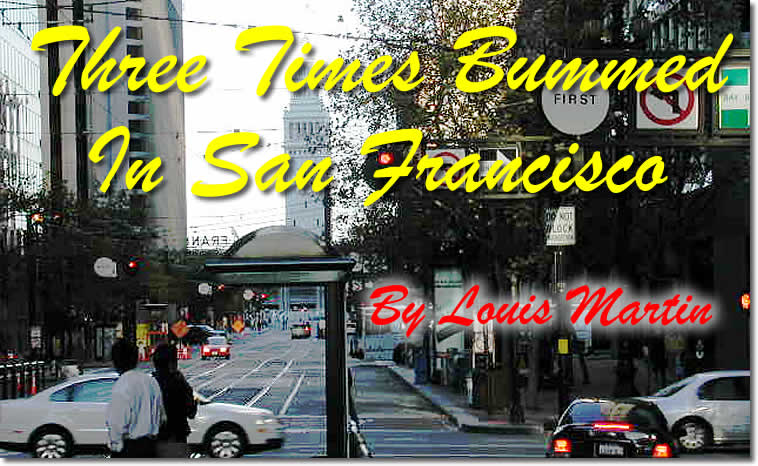
San Francisco, now and then. As the fog rolls in, now becomes then, gives birth to dreamier when. Oh, let us begin to begin to begin. Before the end. A bone-chilling fog blows in through the Bay.
"If you can't say 'fuck,' you can't say 'fuck the government.'"—Lennie Bruce
Enrico Banducci went to see Lennie Bruce perform at his mother's strip joint down in San Diego, and the sailors who frequented the place would not shut up long enough for Bruce to do his comedy routine. "Bring on more tits and ass," they shouted when Bruce appeared on stage. So Bruce stripped and showed them his behind. Nevertheless, Enrico decided to give him a try at the Hungry i in San Francisco.
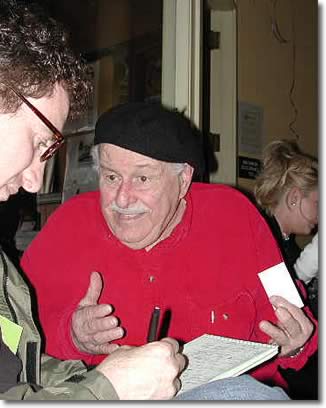 "He
was very funny," says Enrico (left). "He wasn't doing much of
the filthy stuff yet." When he did start doing it, says Enrico, that
is when he let him go—"because I thought it was getting a little
too much." Apparently Herb Caen thought the same; he did not write
good things about Bruce, as he had of Mort Sahl, who also performed at
the Hungry i.
"He
was very funny," says Enrico (left). "He wasn't doing much of
the filthy stuff yet." When he did start doing it, says Enrico, that
is when he let him go—"because I thought it was getting a little
too much." Apparently Herb Caen thought the same; he did not write
good things about Bruce, as he had of Mort Sahl, who also performed at
the Hungry i.
But Enrico says he personally did not mind it. He also says that Caen and Bruce had had an argument, and that is why Caen did not like him.
"He would say 'cum,' says Enrico, 'think cum; now we'll take that word apart. What does it mean?'" At the time such public language was taboo in America.
Enrico got Off Broadway to hire Bruce, and that is where the real "filth" started, which lead to Bruce getting arrested nightly by the cops.
One night Enrico went into Off Broadway when Bruce was performing and a guy in the audience was holding his hands over his girlfriend's ears. Bruce addresses the guy, "Hey, Jack, you're holding your girlfriend's ears?" "Yeah," the guys shouts out, "I don't want her to hear this filth." "Oh, that's funny," says Bruce, who claimed to know the guy, "when we were kids in the block we used to pay you fifty cents to jack-off your dog, and now you're holding your girlfriend's ears." The guy grabbed his girlfriend and stormed out of Off Broadway. Not awfully funny, that one, but it does shows the direction that Bruce's humor was headed. He was playing with the language taboos of the time, and he was playing with hypocrisy.
Says Enrico, "He pushed the limits because he felt he had to. He used to say to me, 'Enrico, if I call you a son of a bitch, I didn't hit you with a club, did I? It's a word in a dictionary... I just want them to know that freedom of speech is still there, and the more they fight me the more I'll fight them.'"
In San Francisco Bruce was put on trial and there he won the case. But he had also been arrested at the Crescendo in Los Angeles and was due to go on trial there. He was afraid to face a Los Angeles court. "He didn't think he would beat them," says Enrico." One day Bruce told him, "I know they are going to put me away, and I don't want to go to jail... I'll kill myself rather than go to jail." Bruce claimed the Los Angeles district attorney told him they would put him away for a couple of years.
Two weeks after this conversation, Enrico says he got off a bus and saw the headlines, "Lennie Bruce Dies," along with a photo of Bruce fallen down at a toilet. He died of a heroin overdoes. When he worked the Hungry i, Enrico says Bruce did not use heroin; his wife, Honey, however, did.
Like a lot of comedians, Bruce was unstable at times. Enrico remembers how late one night he and Bill Cosby where downstairs at the Hungry i playing dominos when a kid came running in saying Bruce had just jumped out a window. Enrico and Cosby went flying up to the street to find Bruce sprawled out on the sidewalk. Bruce explained: "I asked my guitar player to kiss me and he said he wouldn't. So I said if you won't kiss me I'm going to jump out the window." Miller, the guitar player wouldn't, and Bruce jumped.
Bruce was okay. He spent a few days in the hospital for observation and then was released. As you might surmise, Bruce was bisexual. He had a particular attachment for En rico."Every time he would see me, he would kiss me right on the mouth," says Enrico. "Hey, Lennie, cut it out," Enrico would say. Bruce told him not to worry about it, that it was "pure love."
The career of Lennie Bruce was a short one; he had only been performing for about a year and half when he killed himself.
"I'm very grateful for
what he did," says Enrico. He loosened up the country." Back
then, he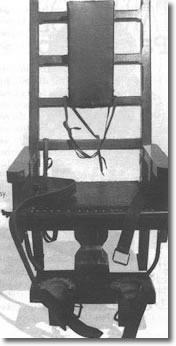 says, people were uptight if they heard you say the word "hell."
In a way, Bruce was the sacrificial lamb of free speech in America.
says, people were uptight if they heard you say the word "hell."
In a way, Bruce was the sacrificial lamb of free speech in America.
Nowadays, everybody pretty much says everything; and 10-letter words, and the shorter four-letter ones, seem to be on the tip of everyone's tongue, if not in actual use. Which goes goes to show that everything goes in cycles. Frankly, it would be kind of refreshing to get some relief from the unoriginal use of "naughty" language used by the masses. It is kind of the same with baseball caps. When all are turned around backwards and worn "bad-boy" style, where is the meaning?
Bruce, were he alive today, could probably pull it off by wearing it sideways or turned inside out. But then he was irreverent and original.
"If Jesus had been killed twenty years ago, Catholic school children would be wearing little electric chairs around their necks instead of crosses."—Lennie Bruce
"Gan(1) bai(1)" (cheers!),
the two of them said. There was a glow of light in the bar on First Street.
I remember the owner-bartender pouring more into my glass, which was not
empty. I remember a hand reaching for the pile of money that I placed
on the bar because they don't take credit cards. And then the lights,
my lights, went out. The next thing I remember was confusion at three
in the morning, difficulty breathing, and groaning, thinking I'm going
to wake up the neighbors.
It did not occur to me for awhile that I had been drugged. I could not remember anything since about nine o'clock the night before. Total amnesia.
I checked my wallet. The money was gone. I checked my carry-bag. Everything looked rearranged. I was back in my apartment on Jones Street but I had no idea how I had gotten there. I went down to the lobby and asked Gordon, the doorman, if he remembered my coming in. He did. A cab dropped me off. He said I seemed okay but the cab took awhile out front. He looked in his records and came up with the number of the cab: Luxor 1144. According to the desk log, I had come in at 11 PM. It was now 3 AM. Enough detective work. I was baffled but went to bed.
The next day I was jittery and irritable and had occasional rapid heart beats; I also had trouble talking. I would start a sentence, stop in the middle, unable to put the words together. I began to try to piece things together. The cab seemed a good starting point. Where was I picked up? At the bar? Was the driver in on it? Had he been paid to drop me off? Surely the driver did not expect the cab to be logged at the destination point. I called Luxor and got the main dispatcher.
He said he thought someone named Carlos was driving 1144 but for some reason he was uncertain about it. I thought they had to keep records. He did some checking. Finally he said he would have Carlos call me when he came in on Sunday. This was Saturday, and I had been drugged on Friday.
Carlos did not call the next day, so I called Luxor again. I was told to call the main office on Monday. I did so, dialing through various menu options until I got through to one of two complaints numbers. I got a recording, left a message for Luke Field, and waited. No return call. I dialed through the same menu options until I got the second complaints number and left a message for Tom Stangalini. Nada. I then called Luxor president John Lazar and left a message. Nada nada. I was not a happy Luxor customer if I had every been one! Thoroughly pissed—please excuse my unoriginal language, but at least it is heart-felt—I called the robbery division at the Hall of Justice. The calm gravely voice of officer Moore told me how to get Luxor's attention. "And next time" he said wryly, "use De Soto." I did what he told me: I paid a visit to the taxi permits department at the Hall of Justice and explained my problem to officer Niven. Niven understood. He said he would give Luxor a call.
I flagged down a cab in front of the Hall of Justice—a Yellow cab, not De Soto but not Luxor—and by the time I was home, there was a message on my phone from Luxor. It turns out the driver was a woman by the name of Consuelo. A few hours later she dropped by the apartment and filled me in. "I picked you up on Broadway and Columbus in the North Beach district on the Northeast corner of Broadway.... We followed Broadway up over the tunnel to Jones .... I do remember that there was another vehicle double-parked in front of your building, and I remember waiting for a couple of seconds, but then it cleared out... I do remember that you were incredibly wasted, but it is not very unusual on a Friday night to pick up people who have been drinking a lot. You had a tough time talking but as far as anything else, you did not convey your feeling ... You gave me about six dollars on a four-dollar-and-ninety-cent fare ..."
Her story seemed straight. I had begun Friday evening at Les Joulins Jazz Bistro down on Ellis, where saxophonist Charles Unger, singer Valencia Hawkins and others play on Fridays and where I had had dinner and a couple of drinks; then I had gone to an ATM on Market and gotten 200 dollars at 8:30, according to the ATM slip; I then headed up Market to the place on First. I had plans to go over to Tosca's in North Beach later. I never made it to Tosca's according to Richard, Tosca's bartender, but apparently I did make it as far as the northeast corner of Broadway and Columbus. I make regular rounds of the city three or four nights a week to get material for stories. I thought I knew my route pretty well. Parts of the City, like Tenderloin, are a bit risky, but First Street did not seem like a high-risk area to me. But I may have become sloppy in the course of breezing though a lot of places without any past trouble. Call me lucky. Call me stupid. I will accept either or both appellations.
As I said, the incident on First Street occurred on Friday. I called the police on Saturday but waited till Sunday to go over to Central Station on Vellejo to file a report. I felt like I needed to settle back into my body before visiting the police; which is to say, on Saturday I felt pretty strange. After discussing what happened with officer Vargas, it was apparent I had a problem: I had total amnesia and the likely drugs, GBH (Great Bodily Harm) or Rohypnol ("roofies"), leave no trace in the blood. Nevertheless, Sunday I went over to Saint Francis Emergency for drug testing. It turned up nothing, as expected. My friends on First Street had apparently picked the right drug for the job. I had no memory of what had happened and no evidence of anything, other than the testimony of a cab driver that I was "incredibly wasted." In San Francisco being incredibly wasted is not all that uncommon.
 At
Central Station, I decided to file an incident report but not get a case
number. By filing only an incident report—you get an incident number,
I got 022931743—the report does not go to the robbery division.
Clearly what I needed was more evidence and if I sent what I had to robbery,
then the bar would be alerted and I would probably have little chance
of coming up with anything concrete. And this way I was free to go after
the perpetrators in my own way. I could, for instance, wait a week or
so, then go back as if nothing had happened and see if I could get a repeat
performance. That sounded interesting. Also, Halloween was coming up,
which gave me an opportunity to pay them a visit in disguise. What fun!
I went and bought a mask at the Halloween Store on Market, an eye dropper
and bottle at Walgreens on Montgomery, and at Radio Shack on Pine a small
recorder and mic that could easily be concealed. I was doing my shopping
right in enemy territory. It was exciting. The mask was of a black comedian
with a big toothy smile and slicked-back hair. It was a rubber mask that
you pull over your head, completely concealing face, ears, hair and all.
At
Central Station, I decided to file an incident report but not get a case
number. By filing only an incident report—you get an incident number,
I got 022931743—the report does not go to the robbery division.
Clearly what I needed was more evidence and if I sent what I had to robbery,
then the bar would be alerted and I would probably have little chance
of coming up with anything concrete. And this way I was free to go after
the perpetrators in my own way. I could, for instance, wait a week or
so, then go back as if nothing had happened and see if I could get a repeat
performance. That sounded interesting. Also, Halloween was coming up,
which gave me an opportunity to pay them a visit in disguise. What fun!
I went and bought a mask at the Halloween Store on Market, an eye dropper
and bottle at Walgreens on Montgomery, and at Radio Shack on Pine a small
recorder and mic that could easily be concealed. I was doing my shopping
right in enemy territory. It was exciting. The mask was of a black comedian
with a big toothy smile and slicked-back hair. It was a rubber mask that
you pull over your head, completely concealing face, ears, hair and all.
Now Halloween was an interesting experience in itself. I wore the mask, along with a Royal Stetson hat and full-length black coat. The effect was striking. I have not dressed up for Halloween in years, and what first surprised me was the automatic reaction you get from people when, through the means of a mask, you present them with a certain personality. Almost everyone who saw me out on the street smiled as if I were a most amusing character, when in fact I felt quite the opposite. I was out there to "get them" and was being quite calculating about it. There was in fact nothing amusing about me. I suppose actors are well aware of this phenomena but for me it was brand-new.
The same thing happened at the bar. I was a most amusing character and one person even wished me a "Happy Halloween." "Screw Halloween," I might have replied but didn't. Underneath the mast I was not smiling at all; in fact, if I was anything, I was angry and revengeful. Through the small eye holes in the mask I was glaring, trying to take in as much as possible, trying to spot anything that might be useful for my "case" should I have one. When I went to the restroom, it took me a little extra time, as I needed to remove the mask and breathe a little. Someone knocked on the door, which I found irritating. When I came out I said, "Hey, watch yourself, buddy!" in a genuinely angry tone of voice and he took it for a joke, which is probably all for the best. He was a big guy.
While amusing in its own way, my night out as a black comedian netted me nothing new, other than the fact that the owner opened the place up, according to the bartender—yes, he also found me a most amusing character and came over to chat—then came in around 9 to check on things. I gathered the owner was not working the bar very hard. It was also clear that business was not very good. Did that make it okay to rob unsuspecting customers? Not according to the penal code.
A week after Halloween I decided to make a call as myself. And I decided to add a bit more incentive for the bartender and her "girl." I went to the bank and got a fat wad of bills—mostly 1s and 5s, but 20s to put on top. It was impressive. I began to feel like the sting man in crime movie. It felt good. I had a straight shot of Bombay Saphire before I called a cab to take me down to First Street. It burned nicely as it went down and made me relax.
It may have even made me a little bit mad, because when the owner went for the pile of bills—playfully so, reaching out for them with a smile on her face—I slammed my hand down hard on them and she backed off. I smiled a little to counterbalance my aggression. She came around the bar and sat down on my left. She smiled. A game had begun, and we both wore smiley masks.
The owner, let us call her F., is a heavy middle-age woman and no longer attractive. Her girl, W.—the cops call such girls "B girls"—is in her twenties and definitely attractive, though she looks about ten years older due to heavy drinking and smoking. So F., though capable of pouring the drink that could put me out, must have felt that she needed the special touch of W. F. told me that W. had just left, as business was slow, but she said she would call up W. and see if she could come back. Would I like that, asked F.
I was feeling ornery and told F. I could care less. To be honest I had been attracted to W. and felt rather outraged at what she had done. I had not had a relationship with her but she was definitely the most interesting of the Tenderloin "B" girls that I had met, and I had been making a study of them. She was temperamental when drunk and reflective when sober, which was not very often; and she had classic Chinese features: broad forehead and small, delicate lips like a closed flower. In a silk robe she would look like a fine lady in a beautiful and serene painting—if you could get the cigarette and drink out of her hand. She was usually dressed, however, in tennis shoes and a dark sweater. Maybe I should take a kinder attitude towards W. She was in fact poor. She was from China and had been here about two years, working the bars for drinks and tips. Not a great life, really, as it turns you into an alcoholic. Once I ran into her when she was wearing a dress, and she told me it was the first time she had every worn one. It was a pretty drab garment. Still, I did not like getting drugged and robbed.
Finally F. took the initiative to call W. on her cell phone, had a long conversation with here in Chinese, then handed me the phone.
"W. wants to talk to you."
My anger surprised me: "I don't want to talk to her," I said sharply.
For the moment I decided to
leave things just like they were. I was mad about what had happened, but
it did not seem worth dying for. I headed for Enrico's over in North Beach.
Yep, it's still there, but Enrico Banducci, grand restauranteur of San
Francisco, retired long ago.
"If
you will die for me,
I will die for you ..."
—Romeo & Juliet from "Rommel Drives on Deep into Egypt"
by Richard Brautigan
"Richard, come here, what's
the matter with you?" That's what Enrico called out to Richard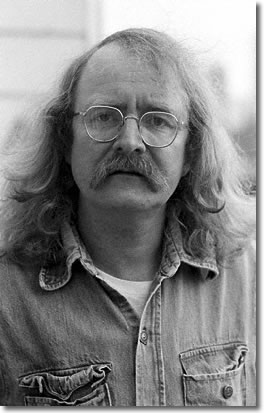 Brautigan (photo right, credit: Erik
Weber) one day when Brautigan, in cowboy hat, stood across the street
from Enrico's Sidewalk Cafe refusing to come over. Brautigan was a regular
hanger-outer at Enrico's back then. Finally Brautigan crossed the street
and sat down at a table with Enrico.
Brautigan (photo right, credit: Erik
Weber) one day when Brautigan, in cowboy hat, stood across the street
from Enrico's Sidewalk Cafe refusing to come over. Brautigan was a regular
hanger-outer at Enrico's back then. Finally Brautigan crossed the street
and sat down at a table with Enrico.
"I'm too much trouble for you," Brautigan whines.
"No you're not," says Enrico.
The night before Brautigan had gotten, or thought he had gotten, Enrico to fire one of his waiters who had, according to Brautigan, insulted him.
The waiter's name was Bert and Enrico had called him over to the table. "Bert, did you mistreat Richard Brautigan?" asked Enrico.
"We had a few words," said the waiter. "I didn't mistreat him. I just told him that I thought he was a bag of wind or some such thing."
"Okay," said Enrico, "you're fired! Get the hell out of here."
In fact it was a fake firing, Bert understood that, and he staid out of sight until Brautigan left.
Now by the next day Brautigan was feeling terrible about having gotten Bert "fired." He told Enrico he had not sleep all night.
Enrico then told him, "If you want to know, Bert is still here. See him over there?"
Brautigan looked across the restaurant and saw Bert waiting a table.
"Oh, thank god," said Brautigan. He was relieved and hugged Enrico.
Enrico says that he used to meet Brautigan almost every day at the cafe. Then one day Brautigan said to him, "You know what I do every night when I go home?"
"No," said Enrico, "what do you do every night when you go home except go to sleep?"
"I'm playing Russian roulette with a magnum."
"Oh, come on," said
Enrico, "you mean one bullet in the chamber and you spin it?"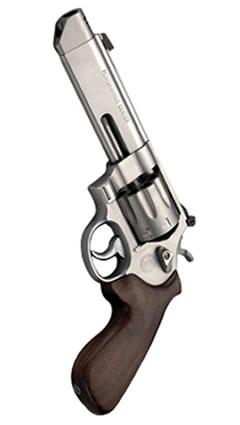
"Yep," said Brautigan, "I haven't died yet."
Writers, like comedians and "B" girls, are not the most stable bunch.
Enrico asked him why he wanted to die.
"I told you," said Brautigan, "if you would listen."
Brautigan explained that his popularity was on the wane. "No one wants to read me."
"That's stupid," said Enrico. "If you write something, people will read you. There are people out there just dying to meet you. I have women come in here and see you and they ask, 'Is that Richard Brautigan?' They want to meet you." Brautigan had just had lunch and was a little drunk on wine.
He said he was not interested unless they were Japanese. His Japanese girlfriend, Masako, had just left him and, according to Enrico, "He really went down hill." He was a person already subject to depression.
It was not very long until Brautigan squeezed the trigger when a live shell was in the chamber. He was 48 years old. Trout fishing in America would never be the same.
Home | City Notes | Restaurant Guide | Galleries | Site Map | Search | Contact